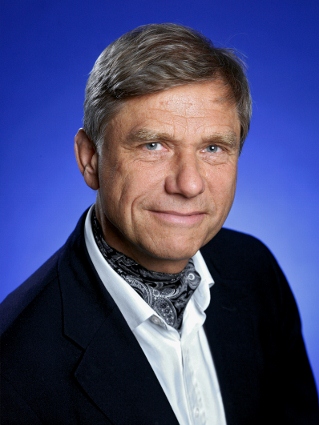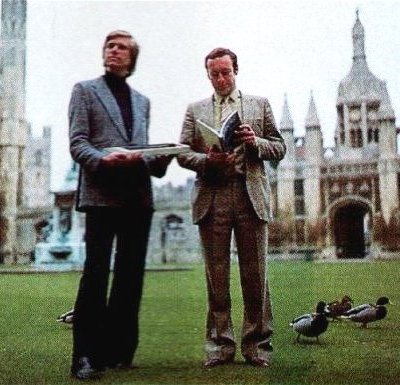
Hermann Hauser may not be known far and wide in America but in Europe, he's a certified tech and investing rock star.

The Austrian-born, now demonstrably English, Hauser is a big part--if not the lead progenitor of the Cambridge UK tech cluster. Coming from computer technology himself, Hauser has done it all: imagined it, coded it, built it, invested in it and exited from it. He's a technology jack-of-all-trades who's contributed much to the often sputtering, industrial-turned-tech economy of England and Europe.
I had met Hauser at a tech investing event in Oxford, England in 1999 and found him to be a very serious personality indeed; serious about business, serious about technology; and serious about investing. But my recent phone conversation was filled with laughter and lighthearted banter--it was a really fun conversation.
"You Yanks," he started off worrisomely, "don't pay attention to anything that goes on over here in Europe," he finished with a big laugh. And he's right with a few exceptions. But that's what in some small way, I'm trying to remedy by writing more about British and European technology icons.
Starting such seminal British companies as Acorn Computers (which ignited then fanned the flames of a micro-computer revolution in the UK and Europe with its BBC Micro) and ARM Holdings (its processors empowered companies such as Apple and Nokia amongst many others to compete and remain afloat during lean times), Hauser is an entrepreneurial-investment cornerstone of European technology.
"Acorn was the most fun," Hauser told me jovially, "these companies I helped build never go away from me." That sounded a lot to me like a parent talking about their children.
I have no doubt Hauser felt patriarchal about Acorn which he started in 1978 with his friend Chris Curry. "The Acorn BBC micro computer," Hauser stated affectionately, "educated a whole generation and became the standard for British schools." In fact, Acorn was referred to as the "British Apple."

Hermann Hauser and Chris Curry at Cambridge University
(sometime in the 1970's, from the looks of Hauser's lapels)
Seminal Hauser Quote #1: "Bill Gates came and saw me in about 1981 and showed me MS-DOS," Hauser remembered, "after, I then showed him BBC Basic, I said to him, 'Bill, how could we possibly have such a retrograde step backward to your inferior OS?'" For Gates, ouch.
The BBC Basic program had by then had become the computing language for English school boys. Hauser recalled, "I had Bill type '*I am Johnny' and then he immediately wanted to log-on to the network to access the underlying code." I'll just bet he did.
Autonomy founder, Dr. Mike Lynch whom I profiled last fall in TechScape, wrote in a BBC article retrospective on the Hauser/Curry machine, "The BBC Micro was pretty fundamental to how my life turned out, in that it was the first computer I ever owned." Hmmm ... Lynch of course would ultimately sell his UK software company to H-P for billions, so Hauser as the article well confirms, has had a long-running and undeniably positive impact on the British and European economies. Not to mention their 'entrepreneurial engines' ... their people starting businesses.
Eventually, in 1985 when Olivetti took control of Acorn, Hauser was appointed VP of Research. "It was a wonderful time," Hauser remembered fondly, "I managed Olivetti labs all over the world and I got to work with fine minds like Jim Mitchell, who was Sun Fellow and one of the brightest people who ever worked for me."
After the ultimate fun of Olivetti Labs, Hauser left to start Active Book Company using £1 million of his own money and making one of the earliest tablet products ever. Avoiding the Apple-like proprietary 'walled garden' strategy this time, Hauser trumpeted his new device from the top of every technology mountain and it wasn't long until AT&T came calling. It had been less than two years from the time Hauser started Active Book until the AT&T acquisition which left Hauser CTO and European Chairman of AT&T division EO until it closed in 1994.
Seminal Hauser Quote #2: "Larry Ellison came to Acorn doing due diligence on his 'Network Computer,'" Hauser told me, "he had invested $4 million in it and was waving it around--it was an Acorn box. We thought, 'This is going well; what else can we sell him?' So we showed him a wireless tablet which was Unix and he immediately wanted to buy our entire laboratory. I told Larry, 'you can't but the lab but we'll sell you one half of it.' Larry invested $10 million on the spot."
ARM Holdings (Advanced RISC Machines) was a 1990 spin-off subsidiary of Acorn, originally having built the processors which powered the various Acorn computers. Hauser was pivotally involved in this spin-out process. In an amazing twist of fate, ARM was to become even more successful and influential than its legendary parent.
To give some idea of the scale of ARM, the company Hauser built, consider this: according to Hauser, ARM will sell eight billion chips this years which he is quick to point out is more than Intel has sold in their entire company history.
Seminal Hauser Quote #3: "John Scully, then Apple CEO came to see us circa 1989 when Apple's survival was completely dependent on the Acorn," Hauser beamed. "Larry Tesla, the Apple CTO said, 'we really like the ARM processor' and that was a very good thing as we had been trying to spin-out ARM for three years with no luck. Apple invested $1.5 million for 43% of ARM. Scully sold the ARM stake later for $800 million. Later in his book, Scully makes mention of how 'ARM saved Apple.'"
It always seems that America's tech icons were coming to see Hauser; with good reason.
In 1997, Hauser started Amadeus Capital Partners. Traveling constantly; speaking at tech and investing conferences far and wide; always on the lookout for the next 'big thing;' over the years Hauser has built Amadeus into a tech investing giant.
I asked him what his three biggest successes at Amadeus were. As the Brits continually do to Yanks, he one-upped me, giving me four:
1. "Acorn with the ARM spin-out now valued at over $10 billion."
2. "Cambridge Silicon Radio (CSR) backed by Amadeus became the leading Bluetooth company in the world ... great exit for us with an IPO on the London market ... made 12 times our money."
3. "Solexa, which revolutionized gene-sequencing, lowered the cost of sequencing the human genome from $10 million to just over $1,000. This is a factor of 10,000 in five years. Compare this with Moore's Law which is a factor of 32 every 10 years. Solexa was sold to Illumina for $640 million and has revolutionized the sequencing industry having now become the standard instrument for gene sequencing with a 70% market share of a $1 billion plus market."
4. "I set up E*Trade UK circa 1996 which was sold to E*Trade US in 2000."
So you can see that since the BBC Micro and ARM and Olivetti and Active Book, Hauser has kept right on going like a speeding freight train trying to make up lost time.
What made Hauser so smart? "I'm a 'Kingsman,' (a graduate of King's College, Cambridge) Hauser said, "that is, I had the privilege of sharing a class with two Nobel Laureates. You can't live in Cambridge without being exposed to the Life Sciences and that's how I was drawn to Solexa."
When I asked Hauser if he missed the hard corps tech development he used to personally do, he didn't miss a beat. "I'm happy with investing," he said sounding truly satisfied, "I'm happy to continue supporting high-tech companies in new areas of Mobile Computing, Internet and MedTech like Solexa."
I couldn't help getting the feeling that in a few more years, Hauser will have many more successes to report. He doesn't show any signs of slowing down yet.
